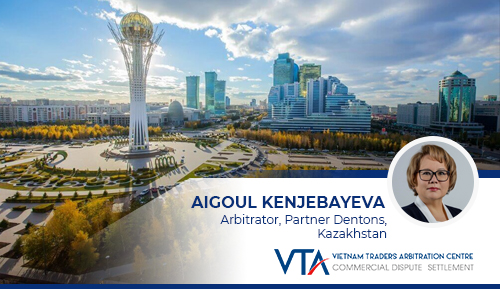Dispute Resolution Mechanisms in Attracting Foreign Investment
In the journey to attract high-quality foreign direct investment (FDI), it is no longer just about geographic advantages, low labor costs, or tax incentives. An increasingly indispensable factor is the presence of an effective, fair, and internationally enforceable dispute resolution mechanism.

From the practical perspective of those directly involved in commercial arbitration, two Arbitrators of the Vietnam Traders Arbitration Centre (VTA) – Lawyer Nguyễn Hoàng Chương and Lawyer Đặng Diệu Phương – have analyzed the pivotal role of arbitration in fostering a stable and transparent investment environment. They also propose practical solutions to position commercial arbitration as a competitive advantage for Vietnam in attracting foreign investment.
The article was published (in Vietnamese) in Vietnam Economic Times – VnEconomy, Issue No. 16 (6357), dated April 21, 2025, under the title: “Dispute Resolution Mechanisms in Attracting Foreign Investment.”
We are pleased to present the full text of the article below
Dispute Resolution Mechanisms in Attracting Foreign Investment
By ATTORNEY NGUYEN HOANG CHUONG (*) - ATTORNEY DANG DIEU PHUONG (**)
In attracting foreign direct investment (FDI), the investment environment plays a crucial role, directly influencing investors' decision-making. Creating a stable, transparent investment environment that protects investors' rights provides significant motivation for capital inflow. One of the key factors in establishing a favorable, transparent investment environment is an effective, fair, and swift dispute resolution mechanism.
In the context of slowing international investment flows, Vietnam remains a bright spot for FDI attraction, with FDI capital in 2024 reaching a record high of nearly $25.35 billion. In 2025, Vietnam is expected to maintain its leading position and continue growth in attracting FDI, especially as the Government undertakes substantial administrative, institutional, and domestic investment environment reforms. To achieve this goal, creating a stable, transparent, and favorable investment environment is the key factor.
Investment Environment and Commercial Arbitration
The traditional dispute resolution method in Vietnam is through courts, which despite recent improvements—including specialized courts for administrative, intellectual property, and bankruptcy matters—still face significant challenges in handling economic disputes efficiently due to large caseloads. Ensuring specialized elements of economic disputes such as quick resolution, high efficiency, and information confidentiality remains challenging for the court system.
Therefore, Commercial Arbitration, with superior advantages such as confidentiality, flexible procedural processes (simplified if chosen under expedited procedures), and high enforceability recognized in over 170 countries, is always preferred by foreign investors. It has become an effective dispute resolution method. Compared to traditional court proceedings, Commercial Arbitration not only saves time and costs for businesses but also protects trade secrets and offers feasibility when enforcing abroad.
Although Vietnam joined the 1958 New York Convention relatively early (in 1995), until now, the Commercial Arbitration dispute resolution mechanism in Vietnam has not developed to its full potential. According to the first legal document on arbitration procedures, the 2003 Ordinance on Commercial Arbitration, and currently the 2010 Commercial Arbitration Law, the dispute resolution mechanism through Commercial Arbitration, though increasingly common, is not yet truly effective.
Vietnam currently has nearly 50 established arbitration centers, but only a small portion are actually operational, and disputes resolved through arbitration account for less than 10% of total commercial disputes in courts.
For contracts with foreign elements, especially if one party has no commercial presence in Vietnam, the chosen dispute resolution body will be foreign arbitration; or if available, the Vietnamese party can usually only propose a neutral body such as SIAC or HKIAC, and recently VIAC or VTA if the foreign party is an FDI enterprise in Vietnam. This shows that the development of Vietnam's arbitration system has only been quantitative but not qualitative.
Additionally, although the Commercial Arbitration Law was enacted over 14 years ago, the legal framework remains incomplete and has not truly aligned with international standards. The mechanisms for reviewing nullification of awards or recognizing and enforcing foreign arbitral awards are still not favorable, as the interpretation of "fundamental principles of Vietnamese law" lacks consistency, despite guidance from the Judicial Council.
Making Commercial Arbitration a Competitive Advantage
The authors have heard a story from a renowned arbitrator about his personal experience negotiating a major project in the 1990s where the foreign party insisted on choosing arbitration as the dispute resolution mechanism, and negotiations were at risk of failure if this clause could not be agreed upon. Thus, Vietnam's efforts to attract FDI need to consider improving the dispute resolution mechanism and turning this into an additional competitive advantage, given that Vietnam already has many other advantages such as strategic geographic location, open and diverse culture, young and dynamic human resources...
To make Commercial Arbitration a competitive advantage for Vietnam, the following synchronized and effective solutions are needed:
First, improve the legal framework: The draft amendments to the 2023 Commercial Arbitration Law need to be quickly finalized and issued soon, with consideration given to adopting the UNCITRAL Model Law to align with international standards, providing clarity and transparency regarding the important content of "fundamental principles of Vietnamese law."
Second, enhance capacity: The organizational and operational capacity of Arbitration Centers needs to be strengthened, and arbitrators need to be professionally trained to improve their ability to participate in arbitration panels examining disputes not only domestically but also regionally and continentally.
Third, expand regional presence and international cooperation: Arbitration is a dispute resolution mechanism where countries "speak the same language." Therefore, commercial arbitration activities need not only develop within Vietnam but must increase presence in the region, enhance cooperation with Commercial Arbitration bodies in Southeast Asia and Asia to exchange experiences, gradually elevating the status of Vietnamese arbitrators as well as the image of Vietnamese Commercial Arbitration in the eyes of the FDI business community.
Dispute resolution mechanisms play an important role in attracting foreign investment, with Commercial Arbitration being a suitable mechanism with great potential for development. To maximize the advantages of this mechanism, Vietnam needs to continue perfecting the legal framework, enhancing the capacity of arbitration organizations, strengthening promotion and expanding international cooperation, contributing to creating a stable, transparent and attractive investment environment, attracting FDI and developing a sustainable economy.
(*) Arbitrator of VTA
(**) Arbitrator, Vice President of VTA



-VTA-

VTA’s Model Arbitration Clause: “Mọi tranh chấp phát sinh từ hoặc liên quan đến hợp đồng này sẽ được giải quyết bằng trọng tài tại Trung tâm Trọng tài Thương nhân Việt Nam (VTA) theo Quy tắc tố tụng trọng tài của Trung tâm này”. “Any dispute arising out of or in relation with this contract shall be resolved by arbitration at the Vietnam Traders Arbitration Centre (VTA) in accordance with its Rules of Arbitration”.
The Vietnam Trade Arbitration Center (VTA) is responsible for organizing and coordinating the resolution of business disputes through institutional arbitration, with jurisdiction over disputes including: (i) disputes arising from commercial activities between parties; (ii) disputes involving at least one party engaged in commercial activities; and (iii) disputes as prescribed by law to be resolved by arbitration.





